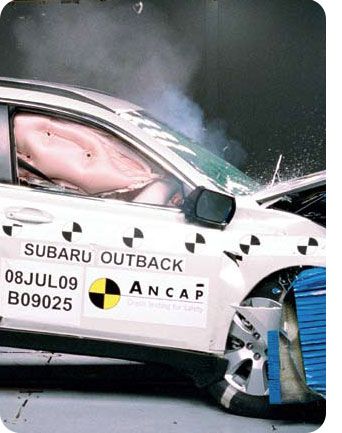Air Bags are a Controlled Explosion
Air bags prevent your body from striking the hard interior components of your vehicle. They are part of your secondary restraint system (SRS).
Your primary restraint system is your seatbelt. You should always wear your seatbelt. Air bags alone are not enough.
Airbag deployment is a controlled explosion. Your vehicle's electronics control the explosion which is why Airbag Service specializes in airbag systems and automotive electronics.

What Happens When You Crash
In an accident, crash sensors send a signal to the Electronic Control Unit (ECU).
The ECU sends a signal to the airbag inflation system.
The airbag inflation system igniter triggers a chemical reaction the byproduct of which is super-heated gas The air bag fills with the gas and explodes from its housing. Air bag inflation occurs in less than 0.06 seconds which is necessary as a typical collision lasts 0.125 seconds. The explosion is smoke-less.
Older airbags and some side-impact airbags contain non-toxic powder that looks like smoke when the bag deploys. Newer airbags no longer contain powder.
The air bag cushions the occupant from hard surfaces. The gas escapes through the airbag fabric deflating the airbag.
This entire sequence occurs in less than a second. The exception is a rollover accident. In a rollover accident airbags stay inflated longer due to extended crash times.
The gas escapes through the airbag fabric deflating the airbag
How Can You Protect Yourself and Your Loved Ones?
- Get the Car Inspected by a Certified Air Bag
- Technician Order a vehicle history - look for accident history and service records
- Search the U.S. Dept. of Transportation database for registered vehicles with deactivated airbags
- Know the safety features of the make/model/year you are purchasing
- Have the dealer confirm - in writing - the safety features are present and in working order
